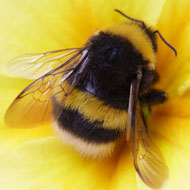Neonicotinoid review delayed until autumn

A recent study suggested exposure to neonicotinoids could impair bumblebees’ ability to learn, with negative consequences for ‘buzz pollination’.
A review of three neonicotinoid pesticides, which are partially banned in the EU, has been delayed until later this year.
Restrictions were placed on the use of clothianidin, imidacloprid and thiametoxam in December 2013 owing to concerns about their impact on bees.
A review by the European Food Safety Authority (EFSA) was due to be finalised this month but will now be delayed until autumn 2017 “to ensure adequate time to consider the very large amount of information received during the call for data”.
An EFSA spokesperson said: “When it imposed controls on neonicotinoids in 2013 the European Commission announced that work on the full re-evaluation of the three neonicotinoids would begin within two years. In 2015, EFSA therefore issued a call for data and commissioned a literature search to gather evidence on which to base these new assessments.
“The information from the call for data included peer-reviewed articles published in journals, study reports, monitoring data, reviews, notes and datasets.”
EFSA is reviewing the risks to bees, looking at seed treatments and granules and taking new data into consideration. The food safety watchdog confirmed the three substances were a threat to bees when used as foliar sprays in 2015.
Much research has been published on the effects of neonicotinoids in recent years - last year alone imidacloprid and thiametoxam were found to reduce the lifespan and number of living sperm produced by male honey bees. Another 18-year study indicated a link between large scale bee declines and exposure to oilseed rape crops that had been treated with neonicotinoids.
A freedom of information request also revealed that studies commissioned by Bayer and Syngenta suggested their own pesticides could cause serious harm to honey bees at high concentrations.
Just last month, a study by the University of Stirling suggested exposure to neonicotinoids could impair bumblebees’ ability to learn, with negative consequences for a type of pollination, known as ‘buzz pollination’ that requires bees to produce vibrations.
Friends of the Earth is calling for a complete ban on the use of neonicotinoids, but National Farmers’ Union vice president Guy Smith is quoted by Farmers Weekly as saying a ban would be “unjustified” under current scientific evidence.



 The BSAVA has opened submissions for the BSAVA Clinical Research Abstracts 2026.
The BSAVA has opened submissions for the BSAVA Clinical Research Abstracts 2026.